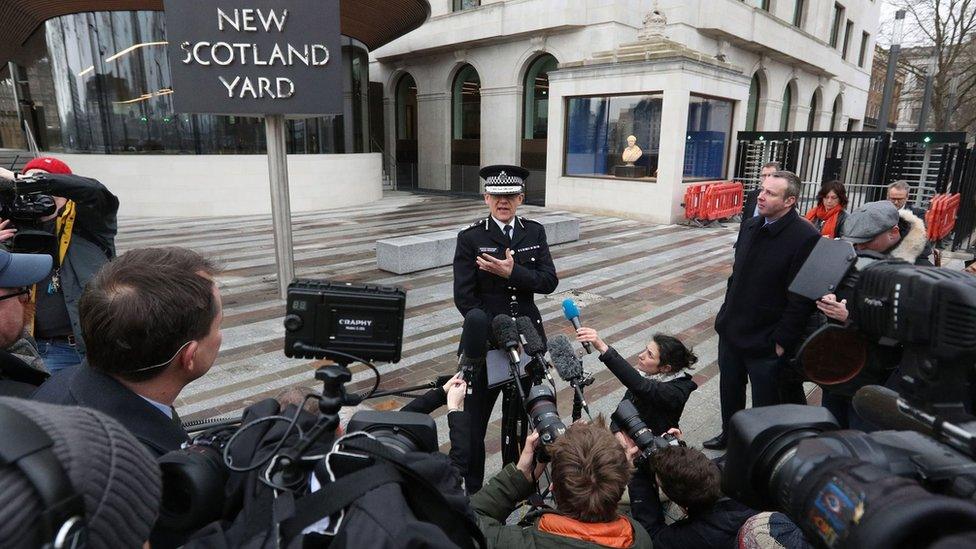London attack: Home secretary says don't blame intelligence agencies
- Published
Rudd: Don't point finger of blame at intelligence services
Home Secretary Amber Rudd has warned against "pointing any finger of blame" at the security services over the London terror attack.
She told the BBC the agencies could not monitor everyone known to them around the clock.
Wednesday's attacker has been named by police as Khalid Masood, who was British born and known to the police and MI5.
Four people died, including Masood, with 40 more injured.
Masood was not the subject of any current police investigations, but had a range of previous convictions.
Ms Rudd said: "I think we have to be careful before we point any finger of blame at the intelligence services. They do a fantastic job.
"The fact that he was known to them doesn't mean that someone has 24-hour cover.
"I think we'll discover more about this particular man and the people around him but I'm in no doubt that the intelligence services are doing a great job.
"I think that would be absolutely the wrong judgement to make.
"I'm confident that as we get more information - and I really can't be drawn any further on it at the moment - that we will learn more and take comfort from the information that we have and the work that the intelligence services do."
Theresa May: We saw best and worst of humanity
She said it was "hard for them" as they operated with "a large degree of secrecy, for good reasons" and urged that they be given the "space" to carry out their inquiries as they needed.
She also defended the government's de-radicalisation programmes, which are aimed at preventing young people being drawn into extremism but which have attracted criticism from some community groups.
She told BBC political editor Laura Kuenssberg: "We have a very successful programme of working with people to stop them.
"You're right, one got through, there may be lessons to learn. Above all I want people to be aware we don't just have a programme that stops people, we have a programme that enters into the communities much earlier on, to stop people being radicalised."
Labour leader Jeremy Corbyn: 'Fear must not divide or cower us'
She also rejected calls for the police and security services to be given more cash to deal with the terror threat, which remains at "severe," as it was before Wednesday's attack, meaning another incident is "highly likely".
She said: "I think that the government and the country has the tools that it needs to combat terrorism. We have the right legislation, we have the right programmes and we have the right support. I don't think it would be right now to have some knee-jerk reaction and introduce something new."
The so-called Islamic State group has said it was behind the attack, in which PC Keith Palmer, Aysha Frade and US tourist Kurt Cochran were killed.
Prime Minister Theresa May earlier told MPs: "We will never waver in the face of terrorism."
Paying tribute to PC Keith Palmer, who died after being stabbed, she said: "He was every inch a hero, and his actions will never be forgotten."
Labour leader Jeremy Corbyn described the attack as "an appalling atrocity".
The victims included 12 Britons, three French children, two people from Romania, four from South Korea, one from Germany, one from Poland, one from Ireland, one from China, one from Italy, one from the US and two Greek people.
- Published22 March 2017

- Published23 March 2017
